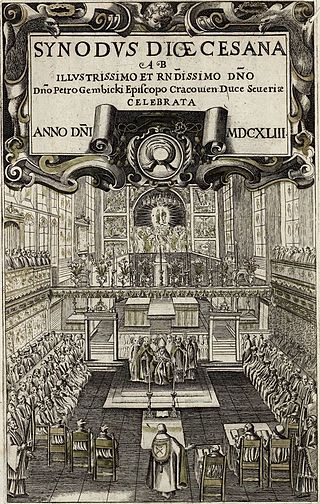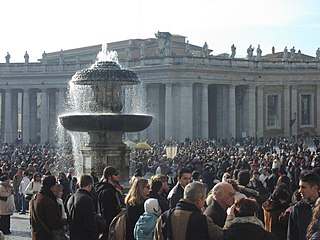
A synod is a council of a Christian denomination, usually convened to decide an issue of doctrine, administration or application. The word synod comes from the Greek: σύνοδος [ˈsinoðos] meaning "assembly" or "meeting" and is analogous with the Latin word concilium meaning "council". Originally, synods were meetings of bishops, and the word is still used in that sense in Catholicism, Oriental Orthodoxy and Eastern Orthodoxy. In modern usage, the word often refers to the governing body of a particular church, whether its members are meeting or not. It is also sometimes used to refer to a church that is governed by a synod.

A prelate is a high-ranking member of the Christian clergy who is an ordinary or who ranks in precedence with ordinaries. The word derives from the Latin praelatus, the past participle of praeferre, which means 'carry before', 'be set above or over' or 'prefer'; hence, a prelate is one set over others.

Crimen sollicitationis is the title of a 1962 document ("instruction") of the Holy Office codifying procedures to be followed in cases of priests or bishops of the Catholic Church accused of having used the sacrament of Penance to make sexual advances to penitents. It repeated, with additions, the contents of an identically named instruction issued in 1922 by the same office.
The process of beatification and canonization has undergone various reforms in the history of the Roman Catholic Church. For current practice, as well as a discussion of similar processes in other churches, see the article on canonization. This article describes the process as it was before the promulgation of the Codex Iuris Canonici of 1983.

A canon is a member of certain bodies in subject to an ecclesiastical rule.
A solemn vow is a certain vow taken by an individual during or after novitiate in a Catholic religious institute. It is solemn insofar as the Church recognizes it as such.

The hierarchy of the Catholic Church consists of its bishops, priests, and deacons. In the ecclesiological sense of the term, "hierarchy" strictly means the "holy ordering" of the Church, the Body of Christ, so to respect the diversity of gifts and ministries necessary for genuine unity.
In the Roman Curia, a congregation is a type of department of the Curia. They are second-highest-ranking departments, ranking below the two Secretariats, and above the pontifical councils, pontifical commissions, tribunals and offices.

In the Catholic Church, a definitor is a title with different specific uses. There are secular definitors, who have a limited amount of oversight over a part of a diocese, and also definitors in religious orders who generally provide counsel and assistance to the superiors general and provincial superiors of their order.
In the jurisprudence of the canon law of the Catholic Church, a dispensation is the exemption from the immediate obligation of law in certain cases. Its object is to modify the hardship often arising from the rigorous application of general laws to particular cases, and its essence is to preserve the law by suspending its operation in such cases.

The Military Ordinariate of the Philippines is a Latin Church ecclesiastical jurisdiction or military ordinariate of the Catholic Church in the Philippines serving the Armed Forces of the Philippines, the Philippine National Police, and the Philippine Coast Guard.
In the Catholic Church, an exemption is the full or partial release of an ecclesiastical person, corporation, or institution from the authority of the ecclesiastical superior next higher in rank. For example, the Roman Catholic Archdiocese of Strasbourg, and the Latin Patriarchate of Jerusalem are exempt, being directly subject to the Holy See.
The appointment of bishops in the Catholic Church is a complicated process. Outgoing bishops, neighbouring bishops, the faithful, the apostolic nuncio, various members of the Roman Curia, and the pope all have a role in the selection. The exact process varies based upon a number of factors, including whether the bishop is from the Latin Church or one of the Eastern Catholic Churches, the geographic location of the diocese, what office the candidate is being chosen to fill, and whether the candidate has previously been ordained to the episcopate.
The conditions for the canonical erection of a house of religious are indicated in canons 608-611 of the 1983 Code of Canon Law.
"Appeal as from an abuse" is a legal term applied in the canon law of the Catholic Church, meaning originally a legal appeal as recourse to the civil forum (court) against the usurpation by the ecclesiastical forum of the rights of civil jurisdiction. It could also mean a recourse to the ecclesiastical forum against the usurpation by the civil forum of the rights of ecclesiastical jurisdiction.

Precedence signifies the right to enjoy a prerogative of honor before other persons; for example, to have the most distinguished place in a procession, a ceremony, or an assembly, to have the right to express an opinion, cast a vote, or append a signature before others, to perform the most honorable offices.

Catholic laity are the ordinary members of the Catholic Church who are neither clergy nor recipients of Holy Orders or vowed to life in a religious order or congregation. Their mission, according to the Second Vatican Council, is to "sanctify the world".
In the Catholic Church, the Synod of Bishops, considered as an advisory body for the pope, is one of the ways in which the bishops render cooperative assistance to him in exercising his office. It is described in the 1983 Code of Canon Law as "a group of bishops who have been chosen from different regions of the world and meet at fixed times to foster closer unity between the Roman Pontiff and bishops, to assist the Roman Pontiff with their counsel in the preservation and growth of faith and morals and in the observance and strengthening of ecclesiastical discipline, and to consider questions pertaining to the activity of the Church in the world."
In the canon law of the Catholic Church, exclaustration is the official authorization for a member of a religious order bound by perpetual vows to live for a limited time outside their religious institute, usually with a view to discerning whether to depart definitively.

The Vatican sexual abuse summit, officially the Meeting on the Protection of Minors in the Church, was a four-day Catholic Church summit meeting in Vatican City that ran from 21 to 24 February 2019, convened by Pope Francis to discuss preventing sexual abuse by Catholic Church clergy.








